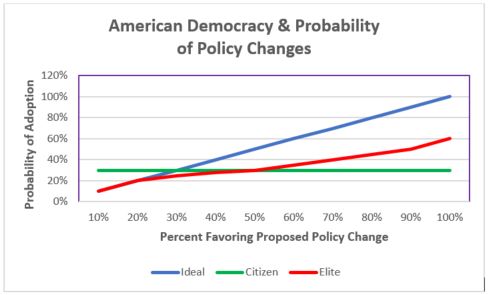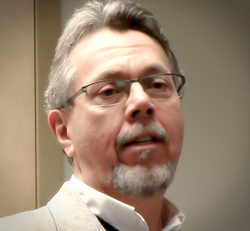“economic elites and organized groups representing business interests have substantial independent impacts on U.S. government policy, while average citizens and mass-based interest groups have little or no independent influence.” You and I don’t matter when it comes to public policy in America today according to a 2014 Princeton study which analyzed nearly 1,800 policy issues. Here is an important quote from the study:
“economic elites and organized groups representing business interests have substantial independent impacts on U.S. government policy, while average citizens and mass-based interest groups have little or no independent influence.” Ouch. These finding are hard for me to swallow as I have spent much of my life organizing and empowering people to address public policy issues that directly affect them. The above graph shows how this plays out in American politics today, according to the Princeton study. The bottom of the graph scale is the percent of people who want to see a particular policy change. The vertical axis represents the probability of that policy change becoming law. The blue line is the ideal. In theory, if 80% of the people want to see a policy change, there would be an 80% chance that the change will be enacted. The red line represents the wealthy elite and business groups. While not perfect, the red line approximates the ideal, especially when compared with what occurs with the green line, when average people like you and me want to see change. The green line is the most troubling. What the Princeton researchers found is that no matter how many average citizens support a policy, it will only realize about a 30% chance of legislative success. It may sound unbelievable that a policy supported by 80% of the American public wouldn’t be easily passed by the legislature, but let’s put those probabilities to the test of reality. Consider:
After looking at the above data, consider this: Most Americans stand behind Obamacare, believe that health care should be provided by the government, and think that corporations and the wealthy aren’t carrying their fair share of the tax burden. Yet, the Republicans passed a health care bill supported by only 17% of the population and cut Medicaid for the poor in order to provide tax cuts for the wealthy. What we have witnessed in the current health care debate is proof positive that the Princeton study is on to something: the wealthy elites and businesses run the policy agenda of our country. That people are dissatisfied with their government should come as no surprise, as nearly three-quarters of Americans voiced their disapproval of congress in recent opinion polls. My guess is that people have felt disenfranchised from their government for a while and the support across the nation for Donald Trump and Bernie Sanders in the last election are a symptom of that sense of alienation. Thankfully, from this alienation has come a new wave of grassroots activism. People from all sides of the political spectrum are now getting involved or re-involved in the political process. Will this new vigor of political involvement be enough to counter the influence and money of business and the wealthy elite cited in the Princeton study? I don’t know, but I believe it has the best chance of success. There are a few steps we can take to spur on this chance of success: 1. Organize at the local level. Local politicians are more attuned to the wants and demands of their constituency. It is at the local level that new organizers can sharpen their skills and build some momentum with policy wins. 2. Run for local office. These new activists should look at running for alderman, school board, county and state legislatures. While we may not be sure who coined the phrase “all politics is local” it is a truism worth supporting. 3. Pay attention to the redistricting issues in your state. After the 2010 election, many elected politicians used the decennial power to redraw voting district lines to – in effect – choose their own constituents. This resulted in the absurd fact that on a state-wide basis, the party out of power can garner more popular votes, but still be shut out of gaining seats in the state legislature. We should spend the time between now and the 2020 census building up the political will to put control of drawing voting district lines in the hands of an independent, non-partisan body and take it out of the hands of elected officials. 4. Work to get money out of politics. Average citizens will never be able to raise the vast sums of money needed to combat the financial and political influence of the wealthy and business lobbyists. The best hope is to limit the amount of money any politician can spend on an election. A 19th century French philosopher noted that “every nation gets the government it deserves. I think that the new political activism we are witnessing is the result of a large mass of citizens waking up to the reality that the government we have is not the government we want. We don’t want the wealthy, the elites, and businesses to dictate our government terms to us. We want a government that actually represents the will of the people. The Princeton study says that we don’t matter. We didn’t matter when we weren’t involved. Let’s see how much we can matter when we are actively engaged.
0 Comments
Your comment will be posted after it is approved.
Leave a Reply. |
AuthorMichael Soika has been a community activist for more than 30 years working on issues of social and economic justice. His work for justice is anchored by his spiritual formation first as a Catholic and now as a Quaker. Archives
June 2018
Categories |


 RSS Feed
RSS Feed